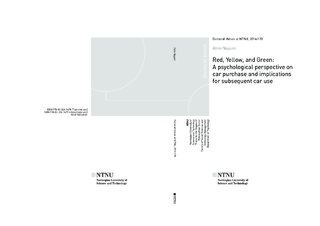Red, Yellow, and Green: A psychological perspective on car purchase and implications for subsequent car use
Doctoral thesis
Permanent lenke
http://hdl.handle.net/11250/2395078Utgivelsesdato
2016Metadata
Vis full innførselSamlinger
- Institutt for psykologi [3086]
Sammendrag
ABSTRACT
- Red, Yellow, and Green:
A psychological perspective on car purchase and implications for
subsequent car use -
Research on consumer behaviors having high impact on natural resources and the
environment is considered important for developing measures for a sustainable future. This
thesis focuses on one of such consumer behaviors – purchases and use of new passenger cars.
The primary aim of the thesis is to examine the effects of socio-psychological factors in
individuals’ car type choice. The thesis also investigates possible rebound effects as well as
psychological spillover effects from the purchase stage to the subsequent use stage. Following
a review of economic models explaining car purchase and socio-psychological theories
explaining pro-environmental behavior, a range of potential determinants of individuals’
choice of cleaner cars are identified. To test the influence of these potential determinants, a
pilot study was carried out in in 2011 using online survey. A larger quantitative data collection
was then conducted in 2012 using similar online survey. For both data collections, Norwegian
car owners who had recently purchased a new passenger car for private use were contacted.
The results show that normative and intentional processes and brand loyalty are significant
determinants of choosing a more fuel-efficient car type after controlling for sociodemographic
factors. At the same time, high levels of environmental concern and altruistic
values are observed while perceived social pressure and intrinsic motives are low among car
buyers. The results, in general, indicate manifold motivations of car buyers. Moreover, the
results show some signs for direct rebound effects in terms of average household car
ownership and frequency of car use among adopters of battery electric cars. Finally, the
research also indicates the positive traces of psychological spillover effects from potential
psychological determinants of car purchases on their respective pendants from car use. Based
on the results, it is suggested to reevaluate the Norwegian government policy, and to design
further solutions in order to best influence behavior change in the long-term. NORSK SAMMENDRAG -
Rødt, Gult, og Grønt:
Et psykologisk perspektiv på bilkjøp og implikasjoner for påfølgende
bilbruk -
Forskning på ulike typer forbrukeratferd som har stor innvirkning på miljø og bruk av
naturressurser anses som et viktig grunnlag for å kunne utvikle tiltak for en bærekraftig
fremtid. Denne avhandlingen fokuserer derfor på én type forbrukeratferd, nemlig anskaffelse
og bruk av nye personbiler.
Hovedmålet med avhandlingen er å undersøke effekten av sosio-psykologiske faktorer som
påvirker individers valg av biltype. Utover dette undersøker avhandlingen rebound-effekter og
psykologiske spillover-effekter, fra anskaffelsesstadiet til det påfølgende bruksstadiet. Etter en
gjennomgang av økonomiske modeller som forklarer bilkjøp, og av sosio-psykologiske teorier
som er relevante for å forstå miljøvennlig atferd, er et utvalg av potensielle determinanter som
har betydning for individers valg av mer miljøvennlige biler identifisert. For å teste
innflytelsen av de potensielle determinantene ble en pilotstudie utført i 2011 ved hjelp av
internettbaserte spørreundersøkelser. En større kvantitativ datainnsamling ble deretter
gjennomført i 2012 med lignende metoder. Begge datainnsamlingene er basert på informasjon
innhentet fra norske bileiere som nylig hadde kjøpt en ny personbil til privat bruk.
Etter kontroll for sosio-demografiske faktorer viser resultatene at normative og intensjonelle
prosesser samt merkelojalitet er signifikante determinanter for å velge en mer
drivstoffbesparende biltype. Blant bilkjøperne er det også observert høye nivåer av
miljøbevissthet og altruistiske verdier, og lave nivåer av ytre sosialt press og indre motiver.
Generelt indikerer resultatene mangfoldige motivasjoner blant norske bilkjøpere. Forøvrig
viser resultatene noen tegn til direkte rebound-effekter med hensyn til gjennomsnittlig antall
biler per husholdning og hyppighet av bilbruk blant elbileiere. Til slutt antyder resultatene
også positive spor av psykologiske spillover-effekter fra potensielle psykologiske
determinanter som påvirker individers bilkjøp på sine respektive anheng som har innflytelse
på individers bilbruk. På grunnlag av disse resultatene, er det forslått å revurdere den norske
regjeringens politikk, og å utforme ytterlige løsninger for å best mulig kunne påvirke
atferdsendringer på lengre sikt.
Består av
Paper 1: Nayum, Alim; Kløckner, Christian; Prugsamatz, Sunita. Influences of car type class and carbon dioxide emisission levels on purchases of new cars: A retrospective analysis of car purchases in Norway. Transportation Research Part A: Policy and Practice 2013 ;Volum 48. s. 96-108 http://dx.doi.org/10.1016/j.trd.2013.02.007 The article in is reprinted with kind permission from Elsevier, sciencedirect.comPaper 2: Nayum, Alim; Kløckner, Christian; Mehmetoglu, Mehmet. Comparison of socio-psychological characteristics of conventional and battery electric car buyers. Travel Behaviour & Society 2015 ;Volum 3. s. 8-20 http://dx.doi.org/10.1016/j.tbs.2015.03.005 The article in is reprinted with kind permission from Elsevier, sciencedirect.com
Paper 3: Nayum, Alim; Kløckner, Christian. A comprehensive socio-psychological approach to car type choice. Journal of Environmental Psychology 2014 ;Volum 40. s. 401-411 http://dx.doi.org/ 10.1016/j.jenvp.2014.10.001 The article in is reprinted with kind permission from Elsevier, sciencedirect.com
Paper 4: Kløckner, Christian; Nayum, Alim; Mehmetoglu, Mehmet. Positive and negative spillover effects from electric car purchase to car use. Transportation Research Part D: Transport and Environment 2013 ;Volum 21. s. 32-38 http://dx.doi.org/ 10.1016/j.trd.2013.02.007 The article in is reprinted with kind permission from Elsevier, sciencedirect.com
